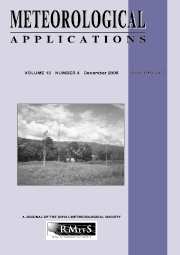Crossref Citations
This article has been cited by the following publications. This list is generated based on data provided by
Crossref.
Hanson, P. J.
Amthor, J. S.
Wullschleger, S. D.
Wilson, K. B.
Grant, R. F.
Hartley, A.
Hui, D.
Hunt, Jr, E. R.
Johnson, D. W.
Kimball, J. S.
King, A. W.
Luo, Y.
McNulty, S. G.
Sun, G.
Thornton, P. E.
Wang, S.
Williams, M.
Baldocchi, D. D.
and
Cushman, R. M.
2004.
OAK FOREST CARBON AND WATER SIMULATIONS: MODEL INTERCOMPARISONS AND EVALUATIONS AGAINST INDEPENDENT DATA.
Ecological Monographs,
Vol. 74,
Issue. 3,
p.
443.
Spyksma, K.
and
Bartello, P.
2008.
Predictability in Wet and Dry Convective Turbulence.
Journal of the Atmospheric Sciences,
Vol. 65,
Issue. 1,
p.
220.
Wilks, D.S.
2011.
Statistical Methods in the Atmospheric Sciences.
Vol. 100,
Issue. ,
p.
215.
Peng, Changhui
Guiot, Joel
Wu, Haibin
Jiang, Hong
and
Luo, Yiqi
2011.
Integrating models with data in ecology and palaeoecology: advances towards a model-data fusion approach.
Ecology Letters,
Vol. 14,
Issue. 5,
p.
522.
Chang, Hui-Ling
Yuan, Huiling
and
Lin, Pay-Liam
2012.
Short-Range (0–12 h) PQPFs from Time-Lagged Multimodel Ensembles Using LAPS.
Monthly Weather Review,
Vol. 140,
Issue. 5,
p.
1496.
Qi, Liangbo
Yu, Hui
and
Chen, Peiyan
2014.
Selective ensemble‐mean technique for tropical cyclone track forecast by using ensemble prediction systems.
Quarterly Journal of the Royal Meteorological Society,
Vol. 140,
Issue. 680,
p.
805.
Pineda-Martínez, Luis F.
García, Oscar Dzul
and
Hotchkiss, Rollin H.
2014.
Implications of maximum daily precipitation on streamflow of a watershed: a case study in Zacatecas, Mexico.
International Journal of River Basin Management,
Vol. 12,
Issue. 4,
p.
411.
Eelsalu, Maris
Soomere, Tarmo
Pindsoo, Katri
and
Lagemaa, Priidik
2014.
Ensemble approach for projections of return periods of extreme water levels in Estonian waters.
Continental Shelf Research,
Vol. 91,
Issue. ,
p.
201.
Nikolkina, I.
Soomere, T.
and
Raamet, A.
2014.
Multidecadal ensemble hindcast of wave fields in the Baltic Sea.
p.
1.
Salighehdar, Amin
Ye, Ziwen
Liu, Mingzhe
Florescu, Ionut
and
Blumberg, Alan F.
2017.
Ensemble-Based Storm Surge Forecasting Models.
Weather and Forecasting,
Vol. 32,
Issue. 5,
p.
1921.
Yemshanov, Denys
Koch, Frank H.
Lu, Bo
Fournier, Ronald
Cook, Gericke
and
Turgeon, Jean J.
2017.
A new hypervolume approach for assessing environmental risks.
Journal of Environmental Management,
Vol. 193,
Issue. ,
p.
188.
Möhrlen, Corinna
and
Jørgensen, Jess U.
2017.
Integration of Large-Scale Renewable Energy into Bulk Power Systems.
p.
79.
2019.
Statistical Methods in the Atmospheric Sciences.
p.
771.
Liu, Xi
Wilson, Tyler
Tan, Pang-Ning
and
Luo, Lifeng
2019.
Hierarchical LSTM Framework for Long-Term Sea Surface Temperature Forecasting.
p.
41.
Wilks, Daniel S.
2019.
Statistical Methods in the Atmospheric Sciences.
p.
313.
Quets, Jan
De Lannoy, Gabriëlle J.M.
Al Yaari, Amen
Chan, Steven
Cosh, Michael H.
Gruber, Alexander
Reichle, Rolf H.
Van der Schalie, Robin
and
Wigneron, Jean-Pierre
2019.
Uncertainty in soil moisture retrievals: An ensemble approach using SMOS L-band microwave data.
Remote Sensing of Environment,
Vol. 229,
Issue. ,
p.
133.
Guimarães, Bruno S.
Coelho, Caio A. S.
Woolnough, Steven J.
Kubota, Paulo Y.
Bastarz, Carlos F.
Figueroa, Silvio N.
Bonatti, José P.
and
de Souza, Dayana C.
2020.
Configuration and hindcast quality assessment of a Brazilian global sub‐seasonal prediction system.
Quarterly Journal of the Royal Meteorological Society,
Vol. 146,
Issue. 728,
p.
1067.
Sinha, Saurabh
Chen, Yue
Lin, Youzuo
and
Pires de Lima, Rafael
2021.
PreMevE Update: Forecasting Ultra‐Relativistic Electrons Inside Earth's Outer Radiation Belt.
Space Weather,
Vol. 19,
Issue. 9,
Chan, Ming Hei Kenneth
Wong, Wai Kin
and
Au‐Yeung, Kin Chung
2021.
Machine learning in calibrating tropical cyclone intensity forecast of ECMWF EPS.
Meteorological Applications,
Vol. 28,
Issue. 6,
Trancoso, Rosa
Behr, Yannik
Hurst, Tony
and
Deligne, Natalia I
2022.
Towards real-time probabilistic ash deposition forecasting for New Zealand.
Journal of Applied Volcanology,
Vol. 11,
Issue. 1,

